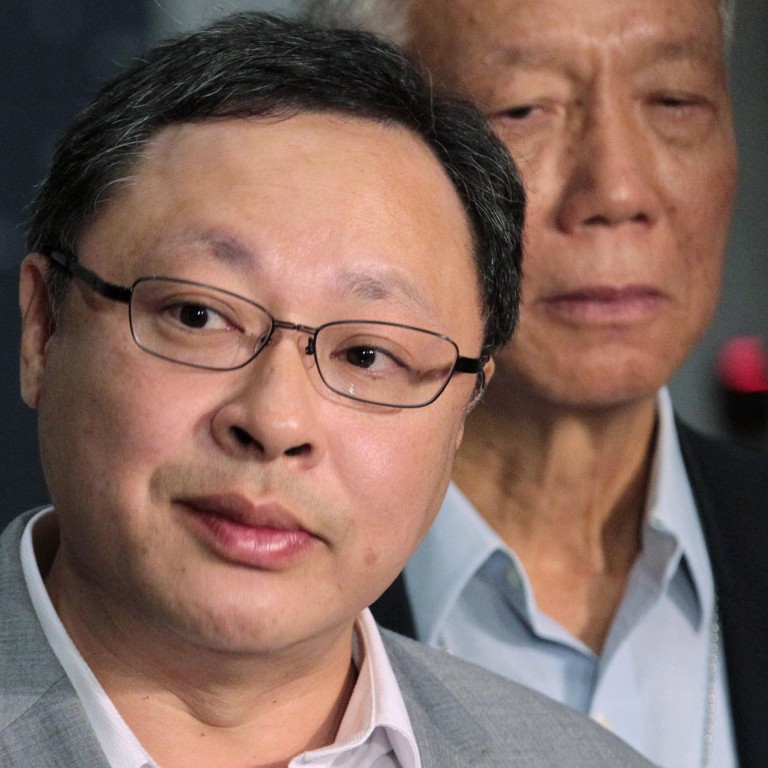
Countdown to confrontation as Standing Committee weighs poll rules
Sunday's expected decision on the framework for the 2017 election may set the scene for more political turmoil and spark Occupy into action
Hong Kong is replete with mysteries, ancient and modern: when will the West Island Line open? Did Song dynasty rulers shelter here?
And, these days, many city residents are mulling one of the most persistent and politically explosive puzzles in Hong Kong: how much say will Beijing allow Hongkongers when choosing chief executive candidates for the 2017 election?
It is assumed that the Communist Party will put restrictions in place, but what they will entail is, up to now, unknown.
If Beijing closes all doors … we will start mobilising the Occupy campaign
However, the answer should be revealed on Sunday.
That's when the Standing Committee of the National People's Congress is expected to unveil a framework and rules for the election, including how candidates will be chosen, a decision that most in Hong Kong expect will restrict the voters' choice.
The committee could allow Hong Kong to discuss the options for reform further, or it could set clear limits. These might include specifying the number of candidates, the method for choosing them, and the threshold aspirants for the top job must meet to qualify for the ballot.
Hong Kong-based political commentator Johnny Lau Yui-siu said: "The parties across the political spectrum will make their next steps according to Beijing's decision on Sunday."

"We will meet on Sunday to assess the latest situation," said Occupy co-founder Benny Tai Yiu-ting. "If Beijing closes all doors to negotiation, we will start mobilising the Occupy campaign."
Some Beijing loyalists want the election requirements to be laid out precisely on Sunday to reduce uncertainty.
"Some hardliners want Beijing to give its final word on Sunday, but some moderates are concerned that a tough decision could provoke a vigorous public backlash and eliminate all possibility of negotiations," said Lau.
Li Fei, chairman of the Basic Law Committee of the National People's Congress, told more than 500 political and business figures in Shenzhen last week that the chief executive must be a patriot and be trusted by Beijing.
The Basic Law says the chief executive must be nominated by a "broadly representative" nominating committee in accordance with "democratic procedures". Beijing officials have repeatedly indicated that to mean "the minority must obey the majority".
City politicians have speculated that the central government will demand a 50 per cent nomination threshold. However, previous elections show that a 50 per cent threshold would essentially screen out candidates from the pan-democratic camp.
No pan-democrat has ever obtained the support of half - or even close to half - of election committee members. The Civic Party's Alan Leong Kah-kit obtained 132 out of 800 in 2007; Albert Ho Chun-yan obtained 183 out of 1,200 in 2012.
Another point Li has made clear is the requirement that the nominating committee alone will have the power to select candidates, as he accused Occupy Central of trying to put forward a chief executive who would confront Beijing.
The NPC Standing Committee ruled in 2007 that the formation of the 2017 nominating committee "could be modelled on" that of the election committee that selected the chief executive in 2012.
Pan-democrats favour the same nominating threshold as was used in the 2012 race, where the support of one-eighth of committee members was required for aspirants to get on the ballot paper.
Li said the purpose of the nominating committee was to reduce the risk of choosing a candidate who might advocate populist policies, confront the central government or be rejected by Beijing.
Professor Lau Siu-kai, vice-chairman of the Chinese Association of Hong Kong and Macau Studies, says a 50 per cent threshold in the nominating committee is necessary. Otherwise, he said, Beijing would find it difficult to explain how a lower threshold could still reflect the committee's collective will.
Some Beijing loyalists have proposed the committee adopt a block voting system and limit the number of candidates on the ballot to four at most.
Under that system, each member of the nominating committee would have multiple votes, depending on how many aspirants are put forward for consideration.
Pan-democrats, though, have fiercely rejected the idea, saying it would mean candidates backed by a minority of committee members have no chance of getting on the ballot.
Lau said block voting was not Beijing's top priority. Instead, he said, he expected the central government to tighten its grip on how the nominating committee will be formed.
The election committee chosen in 2012 comprised 1,200 members - representing four social sectors - who were elected by about 250,000 voters.
Henry Tang Ying-yen, a former chief secretary, said that some issues - such as the composition of the nominating committee - could still be decided among Hongkongers after Sunday's decision.
